|
|
|
Sort Order |
|
|
|
Items / Page
|
|
|
|
|
|
|
| Srl | Item |
| 1 |
ID:
131763


|
|
|
|
|
| Publication |
2014.
|
| Summary/Abstract |
This article argues that the Aden Insurgency was a pivotal moment in the history of British counter-insurgency. We argue that it was in Aden where the newfound strength of human rights discourse, embodied in Amnesty International, and of anti-colonial sentiment, expressed by the UN General Assembly, forced the British government to pay attention to public perceptions of colonial brutality. Using archival sources, we foreground three episodes in the history of the insurgency to support our argument and to illustrate that the changes witnessed were not the result of 'learning' but of a fundamental shift in the international environment.
|
|
|
|
|
|
|
|
|
|
|
|
|
|
|
|
| 2 |
ID:
177490
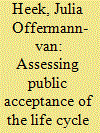

|
|
|
|
|
| Summary/Abstract |
Reducing the high CO2 emissions from the transportation sector requires alternatives to current fossil-based power trains. One possible approach is the development of alternative fuels produced from CO2, water, and renewable energy. Besides technological feasibility of required process steps (CO2 capture, CO2 transport, fuel production infrastructure), a successful adoption requires acceptance of alternative CO2-based fuels and their infrastructure. This study focuses on public acceptance of CO2-based fuels' life cycle by laypeople (N = 325) using conjoint analysis. The laypeople evaluated life cycle scenarios consisting of diverse options regarding CO2 capture, transport, and production infrastructure. To analyze the impact of information on acceptance evaluations, all respondents received information on energy efficiency and environmental impact of the process step options (2nd evaluation stage). The results revealed that CO2 source and transport are most relevant for participants' decisions. Significant impacts of information were found: higher levels of information changed extremely the evaluation of the CO2 capture options (e.g., air capture, chemical plant). The results highlight the importance of investigating laypeople's evaluations of life cycle scenarios, emphasize the relevance of providing adequate information to laypeople, and enable to derive information recommendations to reach a sustained public adoption of alternative fuels and their life cycle.
|
|
|
|
|
|
|
|
|
|
|
|
|
|
|
|
| 3 |
ID:
110852
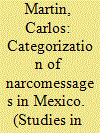

|
|
|
|
|
| Publication |
2012.
|
| Summary/Abstract |
The current article brings together the conclusions of an exercise carried out in an attempt to analyze and classify narcopropaganda, or "narcomessages" in Mexico. The analysis and classification of narcomessages is able to provide some insights about the motivations underlying the increase of violent attacks in the country; at the same time, the classification of these messages can help in the identification of those groups that are more likely to influence public perception and support public policy measures against them.
|
|
|
|
|
|
|
|
|
|
|
|
|
|
|
|
| 4 |
ID:
105781
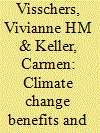

|
|
|
|
|
| Publication |
2011.
|
| Summary/Abstract |
Several countries are currently discussing whether they will rebuild their nuclear power stations in order to continue this type of energy production in the future. The public, with its own opinion about nuclear power stations, has an influential voice in this discussion. As a result, policy makers and nuclear scientists are interested in the public's perception of nuclear power and in what determines this perception. We therefore examined an explanatory model of the public's acceptance of nuclear power based on a telephone survey among a representative sample in Switzerland. The model included such factors as risk perception, benefit perception, affective feelings, and social trust. Moreover, we distinguished between two types of benefit perception: benefit for the climate and a secure energy supply. The model fitted very well to our data and explained acceptance very well. Acceptance was mainly influenced by perceived benefits for a secure energy supply and, to a lesser extent, both by perceived benefits for the climate and by risk perception. Affective feelings about nuclear power appeared to be a central factor in the model. Implications for communication about nuclear power stations and for further research are discussed.
|
|
|
|
|
|
|
|
|
|
|
|
|
|
|
|
| 5 |
ID:
124503


|
|
|
|
|
| Publication |
2013.
|
| Summary/Abstract |
The Covenant of Mayors (COM) initiative invites cities to commit themselves to reduce voluntarily the greenhouse gas emissions within their territories. This manuscript presents the COM initiative and analyzes its mechanisms. In order to better quantify the penetration of the initiative, the authors introduce suitable "participation factors". Moreover, a study and a survey are presented concerning the COM initiative in Greece. Certain barriers are identified preventing the realization of the initiative's full potential in Greece. Results from the public survey indicate lack of proper information and communication about the COM initiative and the obligations arising from its signing towards the citizens itself. Nevertheless, once the citizens are informed properly, the public acceptance of the initiative and its commitments is considerable, to the extent that its success would influence the vote of a substantial percentage of citizens. The positive role of supporting structures is evaluated and may be demonstrated through the survey's results and discussion. Recommendations are provided for future or existing signatories based on the findings of this work.
|
|
|
|
|
|
|
|
|
|
|
|
|
|
|
|
| 6 |
ID:
118630
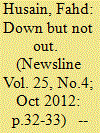

|
|
|
| 7 |
ID:
103529


|
|
|
|
|
| Publication |
2011.
|
| Summary/Abstract |
In August 2009, after 54 years of virtually unbroken rule, Japan's Liberal Democratic Party (LDP) was ousted from power by the Democratic Party of Japan (DPJ). The DPJ's campaign platform included a pledge to facilitate extreme reductions in greenhouse gas (GHG) emissions. Yet, at the COP16 meeting in Cancun, Japan announced that it would not accept further emission reduction targets without broader commitment from all nations. This paper seeks to explain this dichotomy by employing a targeted stakeholder evaluation based on surveys with 321 Japanese citizens to assess the extent to which influential stakeholder groups in Japan supports a potentially costly transition to a low-carbon energy infrastructure amidst severe economic challenges that the nation faces. Findings help explain Japan's adversarial role in COP16 negotiations in Cancun, despite the stated GHG reduction ambitions of Japan's current ruling party. The analysis concludes that if the DPJ does embrace aggressive CO2 reduction targets in the future, the strategic focus will likely mirror the former ruling party's energy policy of bolstering nuclear power generation capacity and promoting energy efficiency improvements while exhibiting lukewarm commitment to supporting capacity development in alternative sources of energy supply such as solar panels and wind turbines.
|
|
|
|
|
|
|
|
|
|
|
|
|
|
|
|
| 8 |
ID:
132674
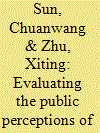

|
|
|
|
|
| Publication |
2014.
|
| Summary/Abstract |
After the Fukushima nuclear accident, more and more attention has been paid to the safety issues of nuclear power in China, even though it is a clean and necessary substitution to coal power. Due to the consideration about the uncertainty of nuclear safety, the local citizens may resist the nuclear power programs in their neighborhood, as indicated by the anti-nuclear movement in Jiangmen 2013. This phenomenon is often related to the public perceptions of "not-in-my-back-yard" (NIMABY). The explosion of anti-nuclear movements will impose adverse effects on the nuclear power decision-making in China. Based on the Contingent Valuation Method (CVM), we evaluate the public Willingness-To-Pay (WTP) for avoiding the construction of nuclear power plants in their neighborhood. Moreover, we analyze whether more information about nuclear energy could improve the public acceptance. Our results show that the comprehensive information will decrease the public risk perception of nuclear power and increase the public support for nuclear power policy. This paper further suggests that China×s decision makers should improve policy transparency and encourage the public involvement of nuclear energy decision making.
|
|
|
|
|
|
|
|
|
|
|
|
|
|
|
|
| 9 |
ID:
166316
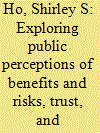

|
|
|
|
|
| Summary/Abstract |
Understanding public perception is critical to developing effective policies for nuclear energy. This study conducted focus group discussions with the Thai and Vietnamese public to understand their trust in potential stakeholders, benefit perception, risk perception, and acceptance of nuclear energy. The participants in both countries preferred economic benefits, such as boosting national development to environmental benefits. Participants perceived nuclear accidents as a major risk, but such perceptions were sometimes based on misunderstandings. The findings suggested that participants evaluated trust toward relevant stakeholders based on their expertise, transparency, and empathy. Overall, participants indicated that their respective countries were not ready for nuclear energy: The Thais thought that their government should heighten public education on nuclear energy, while the Vietnamese thought that their country lacked expertise for managing nuclear power plants. This study also highlights the theoretical and policy implications for nuclear energy development in Southeast Asia. Directions for future studies were discussed.
|
|
|
|
|
|
|
|
|
|
|
|
|
|
|
|
| 10 |
ID:
132761


|
|
|
|
|
| Publication |
2014.
|
| Summary/Abstract |
Over the past half-century, the number of cases entering American federal and state courts has multiplied. But, largely unobserved by the public, the percentage of those cases that are disposed of by trial has steadily decreased. In recent decades, as the increase in filings has leveled off but the percentage of cases reaching trial has continued to fall, the absolute number of trials has decreased as well. Conducting trials is a shrinking portion of what judges do. The effects of this turn away from trials on judges, on litigants, and on public perceptions of the legal system remain to be explored.
|
|
|
|
|
|
|
|
|
|
|
|
|
|
|
|
| 11 |
ID:
150038


|
|
|
|
|
| Summary/Abstract |
A growing area of research has addressed public perception of unconventional oil and natural gas development via hydraulic fracturing (“fracking”). We extend this research by examining how geographic proximity to such extraction interacts with political ideology to influence issue support. Regression analysis of data from a fall 2013 national telephone survey of United States residents reveals that as respondents’ geographic distance from areas experiencing significant development increases, political ideology becomes more strongly associated with issue support, with the liberal-partisan divide widening. Our findings support construal level theory's central premise: that people use more abstract considerations (like political ideology) the more geographically removed they are from an issue. We discuss implications for studying public opinion of energy development as well as for risk communication.
|
|
|
|
|
|
|
|
|
|
|
|
|
|
|
|
| 12 |
ID:
117654


|
|
|
|
|
| Publication |
2012.
|
| Summary/Abstract |
The formulation "ASEAN Community" has been criticized for being too elitist and lacking serious efforts to solicit public opinion. This article examines how the people in Indonesia, Malaysia, and Singapore view the concept of "community building" and the obstacles this initiative may encounter.
|
|
|
|
|
|
|
|
|
|
|
|
|
|
|
|
| 13 |
ID:
166372
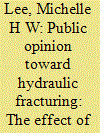

|
|
|
|
|
| Summary/Abstract |
A survey with an embedded experiment was conducted to test how residents would respond to a commitment by oil and natural gas producers to conduct nearby fracking operations in a manner that is more protective of health and the environment than existing state and federal regulations. The experiment specifically assessed how the use of independent third-party certification of operations coupled with "beyond compliance" practices would influence local public support for oil and gas development. The state of Colorado was chosen due to its long history of oil and gas development, its leadership amongst states in advancing fracking, and the current local-level conflicts surrounding oil and gas development. A public opinion survey (N = 390) of a representative sample of Colorado residents found that "green certification" of a production company's activities led to substantially increased levels of support for a hypothetical nearby oil and natural gas project. Our findings suggest that oil and gas developers can obtain greater public support for their projects by voluntarily engaging in practices that are more protective than current state and federal regulations together with third-party certification of those practices. In effect, these coupled actions serve as a mechanism that promotes a firm's "social license to operate".
|
|
|
|
|
|
|
|
|
|
|
|
|
|
|
|
| 14 |
ID:
176672
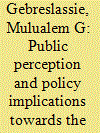

|
|
|
|
|
| Summary/Abstract |
As part of the global effort in the development and deployment of renewable energy, Ethiopia is aggressively working to increase the share of those energy resources into the energy mix. Ethiopia is known for the use of hydropower generation systems but recently the country is introducing wind energy technologies and developed wind farms that started power generation in 2011. However, the public perception towards this new entrant of power generation system is not well understood. This paper therefore explores the perception of the public living within the wind farms. This is achieved through structured survey and conducting household level discussions with the community. The results showed that generally the public is supportive of such development but critical issues have been raised such as lack of prior consultation with the community by the developers, fairness of land compensation and generally lack of inclusive benefit packages from the wind farm development for the community. With the country planning for new wind farm development, it is crucial to devise comprehensive solutions and consider the recommended policy directions in this paper in order to develop public confidence and ownership for sustainability of the developed power generation systems.
|
|
|
|
|
|
|
|
|
|
|
|
|
|
|
|
| 15 |
ID:
168329
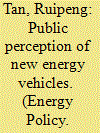

|
|
|
|
|
| Summary/Abstract |
In order to promote the development of new energy buses more smoothly, a random survey of public perception on new energy vehicles and willingness to pay for new energy bus fares is conducted in four first-tier cities in China. We design two sets of questions in the survey and adopt a sample selection model to correct the possible sample selection bias in the estimation of willingness-to-pay for new energy fares. The results show that firstly in the zero willingness to pay samples, very few of them are with genuine zero, the others all being protest respondents. Second, the sample selection model indicates that the sample selection bias is positively significant in the estimation of willingness to pay. Third, income, people's knowledge about new energy vehicles, the degree of recognition of the role of new energy vehicle in improving urban air quality, and views on air quality influence willingness to pay more for new energy bus fares positively. We propose that pricing new energy bus fares higher is reasonable and more knowledge concerning new energy vehicles should be disseminated to the public.
|
|
|
|
|
|
|
|
|
|
|
|
|
|
|
|
| 16 |
ID:
090042


|
|
|
|
|
| Publication |
2009.
|
| Summary/Abstract |
Although the public generally hold positive attitudes towards wind energy, proposals for the construction of new wind farms are often met with strong resistance. In New Zealand, where the government has recently introduced ambitious policy targets for renewable energy generation, negative perceptions of wind farms are increasingly evident and have the potential to prevent the achievement of these targets. This research sets out to examine what influences social resistance to wind farms in New Zealand. Drawing from public submissions on three wind farm proposals, a framework developed by Devine-Wright [Devine-Wright, P., 2005a. Beyond NIMBYism: towards an integrated Framework for Understanding Public Perceptions of Wind Energy. Wind Energy 8, 125-139.] was used as the basis for identification of factors affecting public perceptions of wind farms. The research found firstly that there was no apparent relationship between the proximity of submitters to a proposed wind farm and their likelihood of having a negative perception of the proposal. A wide range of factors written in submissions appeared to have affected the submitter's decision to support or oppose the wind farm proposal. Some of these were consistent with Devine-Wright's findings, but ten further factors were added to the framework to adequately cover the aspects raised in submissions. The findings have implications for the achievement of New Zealand's energy policy
|
|
|
|
|
|
|
|
|
|
|
|
|
|
|
|
| 17 |
ID:
119816
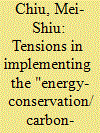

|
|
|
|
|
| Publication |
2013.
|
| Summary/Abstract |
The aim of this study is to investigate the Taiwanese public's perceptions of tensions between the implementation of an energy policy and the practice of traditional culture. The energy policy calls for public actions to conserve energy and reduce carbon emissions. The research participants are 94 people, selected by balancing sexes, ages, and residential areas, from a wide range of vocations. The research data were collected by semi-structured interview with the participants individually. Interview questions were designed to elicit the participants' constructs, beliefs, behaviours, and tensions in relation to energy policy and traditional culture. Data analysis was performed based on a qualitative methodology by the procedure of open coding, theme finding, constant comparison, and theory generation. The analysis identifies four tensions: (1) tensions in knowledge bases between energy conservation and carbon reduction, (2) tensions in lifestyles between having and being, (3) tensions in social systems between authority and conformity, and (4) tensions in creation boundaries between technology and nature. The themes underlying the four tensions are uncertainty, pleasure, power, and control, respectively. Solutions to the four tensions may include practical knowledge, pragmatic idealism, hierarchical collaboration, and sustainable innovation.
|
|
|
|
|
|
|
|
|
|
|
|
|
|
|
|
| 18 |
ID:
186461
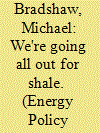

|
|
|
|
|
| Summary/Abstract |
In January 2014, then British Prime Minister David Cameron declared that his government was ‘Going all out for Shale.’ In November 2019, during an election campaign, Prime Minister Boris Johnson's Conservative Government imposed a moratorium on hydraulic fracturing bringing to a halt industry hopes of developing shale gas in the UK. This paper explores what happened, integrating research employing a mixed methods research design including a review of the literature, expert interviews, household interviews, a series of nationally representative and local surveys, and a content analysis of political testimony. It starts with a brief history of the shale gas debate in the UK and social science research on the issue. It then examines the UK's Shale Gas landscape, and in particular energy policy failure, by considering three issues: first, the framing of the shale gas debate in the national Parliament, exploring the arguments for and against it; second, changing public perceptions and attitudes towards shale gas development; and third, the attitudes and lived experiences of the communities most affected by shale gas exploration activities. These three dimensions are combined to explain the UK Government's shale gas failure to-date. The paper concludes by identifying the lessons learnt from the Government's initial policy failure, both in relation to further shale gas exploration, but also for other technologies required for a future Net-Zero energy system.
|
|
|
|
|
|
|
|
|
|
|
|
|
|
|
|
| 19 |
ID:
179556
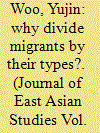

|
|
|
|
|
| Summary/Abstract |
This article compares the public perceptions of various types of migrants in Japan and examines whether Japanese view them equally. Using an original survey, which presented six types of migrants that Japanese people most commonly face in their daily lives, I show several interesting results. First, respondents express the most negative views toward labor migrants. Second, respondents who have migrant friends tend to have more positive feelings for all types of migrants. In contrast, simple coexistence with migrants fails to enhance public sentiment toward labor migrants, particularly those whose stay is temporary. Overall, my statistical results suggest that Japanese people are not pessimistic about every kind of migrant, and their openness increases as migrants acculturate into Japanese society and interact with Japanese people. These findings provide evidence to influence policy discussions on whether Japan should recruit labor migrants in its current form in order to fight its aging population.
|
|
|
|
|
|
|
|
|
|
|
|
|
|
|
|
|
|
|
|
|